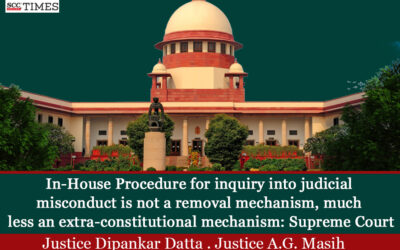High Court Chief Justice Is Master Of Roster; But Supreme Court May Step In When Matters Raise Institutional Concerns Affecting Rule Of Law: SC

While recalling the direction barring an Allahabad High Court Judge from taking up criminal matters, the Supreme Court has held that the Chief Justice of a High Court is the master of the roster but when matters raise institutional concerns affecting the rule of law, it may be compelled to step in and take corrective steps.
The Apex Court made such observations while acting upon an undated letter from the Chief Justice of India with a request to reconsider the directions passed in an earlier order.
The Division Bench of Justice J.B. Pardiwala and Justice R. Mahadevan observed, “We fully acknowledge that the Chief Justice of a High Court is the master of the roster. But, as observed above, our directions are absolutely not interfering with the administrative power of the Chief Justice of the High Court. When matters raise institutional concerns affecting the rule of law, this Court may be compelled to step in and take corrective steps.”
Factual Background
In this matter, an undated letter was received from the Chief Justice of India requesting the Apex Court to reconsider the directions issued in an order dated August 4, 2025 passed in a Special Leave Petition. By the said order, the Apex Court had set aside the impugned judgment of the Allahabad High Court and remanded the matter to the High Court for fresh consideration. The quashing petition was asked to be reheard and the Chief Justice of the High Court was asked to assign the matter to any other Judge of the High Court. The Apex Court had directed that the concerned judge not be assigned any criminal determination till he demitted office.
Reasoning
The Bench, at the outset, made it clear that its intention was not to cause embarrassment or cast aspersions on the concerned Judge. “We would not even think of doing so. However, when matters cross the threshold and the dignity of the institution is imperiled, it becomes the constitutional responsibility of this Court to intervene, even when acting under its appellate jurisdiction under Article 136 of the Constitution”, it mentioned.
The Apex Court in the order in question had stated that many erroneous orders had been noted by it which were passed by the concerned Judge of the High Court. “It is not just a matter of error or mistake committed by the Judge concerned in appreciating the legal points or facts. We were concerned about the appropriate direction to be issued in the interest of justice and with a view to protecting the honour and dignity of the institution”, the Bench said.
Considering that a request was made in writing by the Chief Justice of India, and in due deference to the same, the Bench deleted paras 25 and 26 respectively from the order dated August 4, 2025, whereby non-assignment of criminal cases was directed.
The Bench thus observed, “ We hope that in future, we may not have to come across such perverse and unjust orders from any High Court. The endeavour of the High Courts should always be to uphold the rule of law and maintain institutional credibility. If the Rule of Law is not maintained or protected within the court itself, then that would be the end of the entire justice delivery system in the country. Judges at any level are expected to work efficiently, discharge their duties diligently and always strive hard to fulfill their constitutional oath.”
Cause Title: M/S. Shikhar Chemicals v. The State of Uttar Pradesh (Neutral Citation: 2025 INSC 945)

